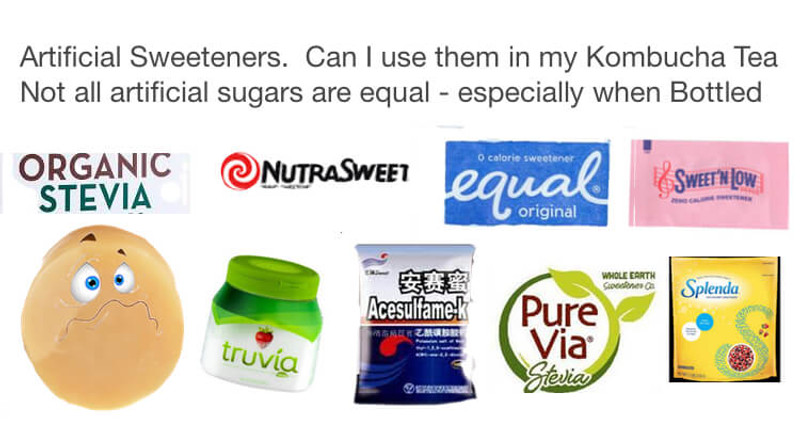Not all artificial sugars are equal - especially when Bottled.
For the most part Artificial Sugars do not ferment, so no in the Primary Ferment, but YES in a Secondary Ferment - or at time of Bottling, and probably best just before partaking of a otherwise wonderful glass that just needs to be sweeten a bit.
- Equal™: is aspartame and there’s a lot of pro and con’s on this ingredient. For Kombucha and other Probiotic Sodas, Equal™ will sweeten to your taste. Over time the sweetness dissipates. Storing in very cold temperatures will slow down the effect, but some bitterness, once covered up returns. Equal™ also contains dextrose (corn sugar) and maltodextrin, real sugars that very slightly sweeten your brew, but can cause continued fermentation which may unbalance your brew from time of bottling to time of drinking. The plus side is that it also may add slight carbonation or effervescence.
- NutraSweet™: is also aspartame but with a second artificial sweetener, Neotame. Neotame is more stable than aspartame and remains sweeter for a longer period of time.
- Acesulfame potassium (Ace-K) (from Wikipedia) “as sweet as aspartame,(which is 200 times as sweet as sugar) about two thirds as sweet as saccharin, and one third as sweet as sucralose. Like saccharin, it has a slightly bitter aftertaste. Kraft Foods has patented the use of sodium ferulate to mask acesulfame's aftertaste. Acesulfame potassium is often blended with other sweeteners (usually aspartame or sucralose), which give a more sucrose-like taste, whereby each sweetener masks the other's aftertaste and also exhibits a synergistic effect in which the blend is sweeter than its components. Unlike aspartame, acesulfame potassium is stable under heat, even under moderately acidic or basic conditions, allowing it to be used as a food additive in baking or in products that require a long shelf life. In carbonated drinks, it is almost always used in conjunction with another sweetener, such as aspartame or sucralose. It is also used as a sweetener in protein shakes and pharmaceutical products, especially chewable and liquid medications, where it can make the active ingredients more palatable”.
- Sweet’n Low™: Saccharin. Saccharin will artificially sweeten your Kombucha Tea. But bottled and left for a long period of time starts to fall out of suspension and settles on the bottom. Commercial soda companies will use a binder to keep Saccharin mixed and your drink sweet.
- Splenda™: Sucralose. The most common sugar substitute. Sucralose is molecularly modified. This form of sugar is sweet and stable BUT very hard for the body to metabolize. The Kombucha’s enzymes can break down some of the sucralose into a simple sugar. These simple sugars then can lead to additional fermentation. Plus Splenda™ adds dextrose and maltodextrin as bulking agents to keep if fluffy which also add to additional fermentation potential and calories. The plus side is that it also may add slight carbonation or effervescence.
- Stevia: Natural plant has zero glycemic index and zero calories, Typically sold in two forms. Green and White. Green which is the whole natural bulk plant and White processed into varying degrees of sweetness (rebaudioside A). There are many health qualities associated with Stevia besides it being natural super sweet and no negatives. The only negative I know of is a very slight after taste. However I see that also as a positive the overall profile of the brew. Once illegal to use as a sweetener, Stevia is now being used in whole or part in combination with other artificial sweeteners. The wine industry has used Stevia with good reports and no negative reviews. For those that don’t mind really Green Kombucha Tea or use a Green Super Food (Alfalfa leaf, Kelp, Spirulina, Spinach, Barley Grass, Wheat Grass, Dulse) Stevia is a super additive. Goes great serving at a St Patrick’s day party - or really anytime
- Truvia, a blend of rebaudioside A and erythritol (developed by Cargill and The Coca-Cola Company)
- PureVia (developed by PepsiCo and the Whole Earth Sweetener Company, a subsidiary of Merisant),both of which use rebaudioside A
- Vitarium the Australia brand uses Natvia, a natural stevia sweetener, in a range of sugar-free children's milk mixes
In my opinion, use the sweetener that you personally are comfortable using. All of the above will sweeten your brew. Personally I feel sweetening at time of serving is the superior trick as it can match you and your company’s pleasure.
Be happy to answer any questions or comments. Text me at 919-518-3336
Best wishes
Ed Kasper, the HappyHerbalist

